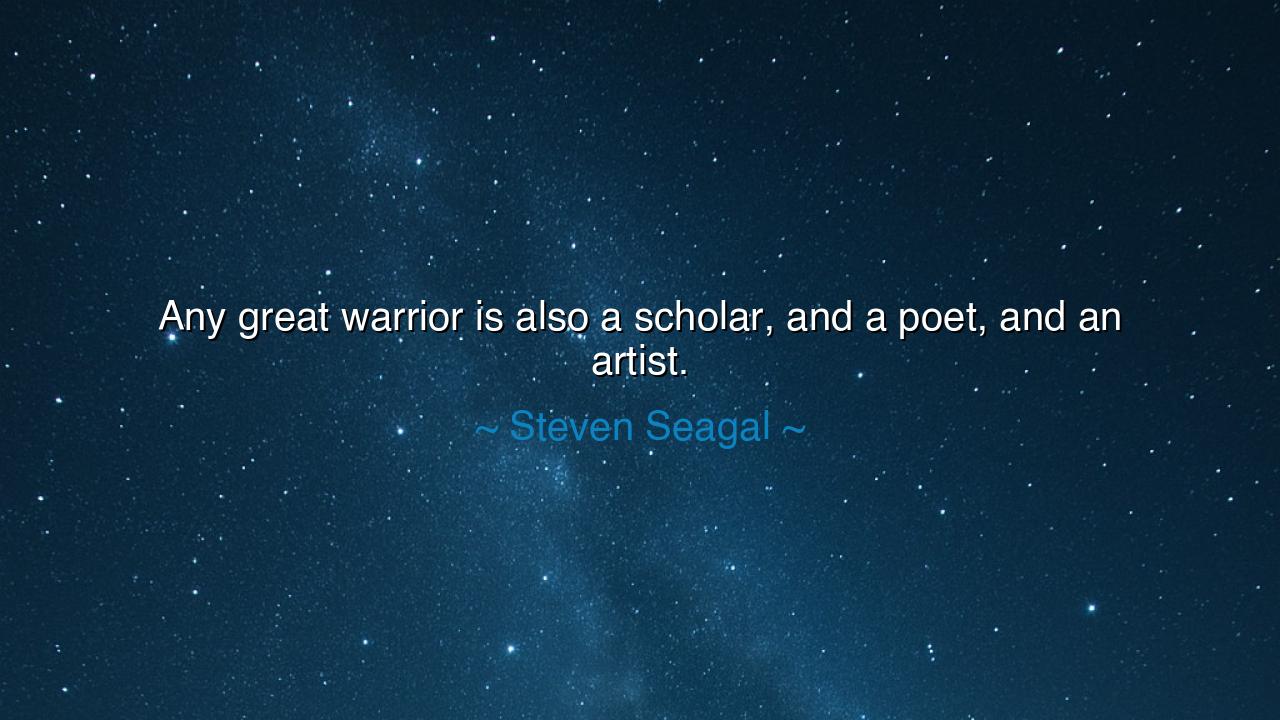
Any great warrior is also a scholar, and a poet, and an artist.






“Any great warrior is also a scholar, and a poet, and an artist.” Thus spoke Steven Seagal, a man who walked the line between strength and serenity, between mastery of the body and mastery of the mind. In these words lies a truth older than time—that greatness in battle is not born merely from power, but from balance, and that the highest form of the warrior is one whose sword serves both discipline and beauty. The warrior who knows only how to fight is a brute; the warrior who knows when not to fight becomes a sage.
For in every true warrior, there burns not only the fire of courage, but the light of understanding. The ancients knew this well. The samurai of Japan called it Bushidō—the Way of the Warrior. Yet their path was not one of blind aggression. They were taught poetry, calligraphy, music, and philosophy, for they believed that the hand that wields the blade must also learn the brush, and that strength without wisdom leads only to ruin. The warrior, to be truly great, must cultivate harmony between destruction and creation, between silence and strike.
Think of the legendary Miyamoto Musashi, the greatest swordsman of Japan. He fought sixty duels and never lost, yet he spent his final years painting ink landscapes and writing The Book of Five Rings, a treatise not only on combat, but on the spirit of mastery itself. He said, “Perceive that which cannot be seen with the eye.” Musashi understood that the greatest battle is not against an enemy, but against ignorance. His sword and his brush were one. He embodied what Seagal’s words proclaim—that the warrior, the scholar, the poet, and the artist are not different beings, but different faces of the same enlightened soul.
To be only a fighter is to be half-alive. But the warrior-scholar sees deeper. He studies the world not to conquer it, but to understand his place within it. He reads not merely books of war, but the book of life itself—the movements of nature, the breath of the wind, the rhythm of the human heart. He learns compassion from pain, patience from defeat, humility from victory. He sees that strength is not the absence of gentleness, but its protector. The sword is only holy when it is drawn to defend, not to destroy.
So too must the poet and the artist live within the warrior’s heart. The poet reminds him of beauty, the artist reminds him of meaning. Without them, the warrior becomes hollow, and his victories turn to ashes. For what is the worth of conquering the world if one loses one’s soul? The warrior who can see beauty in the falling cherry blossom fights not for blood, but for life itself. The one who can hear poetry in silence knows that even the battlefield can become sacred ground. Thus, Seagal’s words are not about violence—they are about wholeness, about the complete human being who lives with purpose, awareness, and grace.
The lesson, then, is this: cultivate the warrior within, but temper it with wisdom. Do not seek power for its own sake; seek mastery over yourself. Read deeply. Create art. Learn to listen as fiercely as you act. Let your body grow strong, but let your mind grow still. The path of greatness lies not in domination, but in discipline—the discipline to balance the fierce and the gentle, the fire and the water, the steel and the song.
Look around you in the modern world: many fight, few think; many speak, few listen. But the true warrior of our age is not the one who defeats others—it is the one who conquers his own chaos. Like the monk who sharpens his mind instead of his blade, like the leader who rules through wisdom instead of fear, you too must learn the art of stillness amid struggle.
So, my child, remember this eternal truth: the great warrior is not the destroyer, but the creator—the one who brings balance to the world through mastery of himself. To be a warrior, be also a student. To be a conqueror, be also a dreamer. To be powerful, be kind. For in the end, the highest form of victory is not over the enemy without, but over the darkness within. And when that battle is won, your sword will not only protect life—it will honor it.






AAdministratorAdministrator
Welcome, honored guests. Please leave a comment, we will respond soon